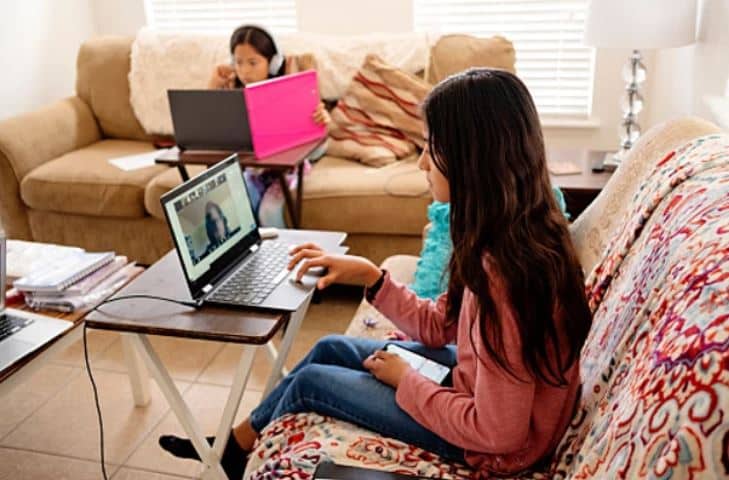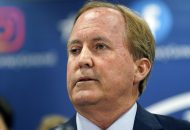New Coalition Urges Permanent Broadband Solutions

As talks resumed between the White House and GOP lawmakers on Friday over President Joe Biden’s $2.3 trillion infrastructure plan, a new coalition announced its intention to push hard for a key element of the plan — expanding broadband access to every American.
Founded to help rural and disadvantaged families stay connected during the COVID-19 pandemic, the Broadband Equity for All coalition’s partners include tech giants and telecoms — Microsoft, AT&T and Comcast — chambers of commerce and advocacy groups, and a wide range of grassroots organizations.
Binding them, in the words of Reggie Smith III, Ph.D, CEO and executive director of the United States Distance Learning Association, is a commitment to the belief that “every American, no matter where they live or how much money they make, should be able to enjoy the benefits that come with having the Internet.”
According to a recent Broadband Now study, of the 42 million Americans living in areas without reliable broadband service, most live in rural communities. And the pandemic has only exacerbated the “digital divide.”
Though President Biden has made a commitment to bringing affordable, reliable, high-speed broadband to every community in America - through a proposed investment of $100 billion – the White House and Republicans on Capitol Hill remain far apart on the size of the eventual infrastructure package.
The last proposal from the Republicans came in at just over $568 billion, meaning negotiators are going to be looking for places to cut. The coalition wants to make clear that downsizing the plan to expand broadband access isn’t the place to start.
“Affordable broadband can be a game changer,” Smith said.
“We live today in a fast-paced global, economic environment, which requires constant innovation, upskilling, and reskilling for lifelong learning,” he said. “Broadband will provide the access to accomplish the things that will keep America competitive.”
[In related news: White House Trims Infrastructure Proposal In $1.7 Trillion Counter Offer to Republicans]
The coalition is urging Congress to adopt a federally-funded broadband benefit program that would be managed and administered by the Federal Communications Commission to provide low-income households with enhanced financial support that will be available long after the pandemic ends.
A predictable, dependable, long-term broadband benefit program would help ensure that all people across the nation are connected, and help guarantee the educational benefits, health care access, and economic prosperity that come with the ability to get online, the members say.
“The COVID-19 pandemic has demonstrated that a broadband internet connection in the home is no longer a nicety; it is a necessity and is a matter of civil and human rights and economic justice,” said National Urban League President and CEO Marc H. Morial in a written statement.
The former mayor of New Orleans observed that “families living in cities where broadband is deployed are even less likely to be connected than families living in rural areas where service isn’t available, and that’s mainly because they can’t afford the service.
“Disproportionately, these are people of color who are of low or modest income. The emergency broadband benefit is a start, but we need a long-term, sustainable solution to begin closing the digital divide for all Americans,” he said.
“For far too long the digital divide for our community has only grown,” said Sindy M. Benavides, CEO of the League of United Latin American Citizens.
“Over 35% of Latino families still lack access to quality broadband. As our world becomes more and more digital, affordable internet access is needed to expand the economic opportunities for our community to thrive. We need a permanent solution so that any family can access the internet without having to sacrifice food or other necessities. The time is now,” Benavides said.
Coalition members contend that while there has been progress to close the digital divide, more needs to be done.
It has estimated that 10-15 million students across the country don’t have broadband at home. At the same time, people with disabilities are 20% less likely to be connected to broadband at home or have the technology to go online than those without disabilities.
Forty percent of seniors don’t have residential service sufficient to meet with their doctors for telemedicine appointments, which have increasingly taken on life-and-death importance.
Smith noted that each of these deficiencies not only negatively impacts individual lives, but also have larger societal costs. To illustrate this, he pointed to a recent NPR report that said high school dropouts — a byproduct, at least in part, of the digital divide, cost American taxpayers $320 billion to $350 billion annually in lost wages, taxable income, health, welfare and incarceration costs.
“Distance learning is the only efficient, scalable, sustainable way to build and protect the value of our current and future workforce – even more so now per the pandemic shift to fully remote work,” Smith said.
As the head of the first nonprofit distance learning association in the United States, Smith said he’s thrilled to be a part of a coalition fighting for broadband’s expansion.
And a spokeswoman for the organization said the coalition is growing all the time. Those interested in learning more about Broadband Equity for All, can visit its website here.
While coalition members say Congress and the Biden administration should be commended for allocating funding to build out broadband in rural America, they also note addressing the rural broadband challenge is only part of the solution.
In that spirit, they say they stand ready to work collaboratively with policymakers to ensure low-income Americans can receive the educational benefits, health care access, and economic prosperity that come with the ability to get online.
“The Multicultural Media and Telecom Internet Council is on record with the FCC for advocating for a permanent broadband subsidy,” said the council’s president and CEO Maurita Coley. “Therefore, joining this chorus of community advocates, public interest tech, businesses, and community leaders resonates with our mission of using policy and advocacy to build equitable tech futures for underrepresented communities in this country. Our vision is to create a fully connected, educated, healthy, and empowered society in which all communities thrive.”
In a recent survey conducted for The New York Times by the online research platform SurveyMonkey, 78% of adults said they supported broadband investment, including 62% of Republicans.























